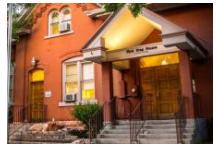At FSH, we serve people working to recover from substance use disorders and other health conditions even though the odds are stacked against them: they have histories of homelessness, criminal records, and very few resources when they enter treatment. Very often, substance abuse has been the catalyst for a downward spiral: a person loses their job, loses contact with family, and becomes homeless. At that point, the path back to stable housing is a steep one. A spotty rental history and lack of current income disqualifies them from most housing options; mental health conditions, disabilities, any history of incarceration, and lack of social capital further narrow their options. Case managers help our clients address housing barriers through a supportive employment program, life skills classes, legal assistance, credit repair, and other services both through FSH and in the community. Improving financial health is a central goal of these supportive services because stable finances are key to a person’s ability to qualify for and maintain housing long-term. When their basic needs are met, people have the capacity to maintain recovery and build better lives for themselves after treatment. The Recovery Support Services program gives FSH clients tools to overcome barriers and maintain stability long-term.
Most clients in case management receive some combination of life skills training, financial education, and employment support. We help clients enhance their financial health through education and micro-assistance, tailored to individual needs. A case manager may help a client open a bank account for the first time and provide a one-time grant to help another client afford a rental deposit or pay for move-in costs to get set up in a new home. Micro-assistance can also include purchasing a bus pass so a client can get to and from work, settling an outstanding utility debt, or covering the cost of a rental application. When appropriate, case managers help clients enroll in First Step House’s innovative employment preparation and placement program, which was recognized during the pandemic as one of the top supportive employment sites worldwide serving persons with disabilities.
Examples of RSS services include:
• Housing expenses: application fees, rental assistance, and security deposits
• Medical expenses: out-of-pocket medical care, Primary Care Network enrollment fees, medication costs, eyeglasses, dental care
• Employment expenses: work uniforms, GED program fees, tuition costs for job training, licensure fees, background checks, ID and birth certificate fees, childcare expenses during a job search
• Transportation expenses: bicycles, bus passes, gas cards, driver’s license fees
Now more than ever in Salt Lake County, low-income individuals and those who struggle with addiction and mental illness face significant barriers to stable housing and financial health. The cost of living is increasing, affordable housing is in short supply, and service providers are working at maximum capacity to meet community needs. In the 2022 Point-in-Time Count of homeless individuals in Salt Lake County, 19% of homeless adults were identified as having a substance use disorder, and 32% as having a mental illness. FSH is uniquely equipped to support this population due to decades of experience as a behavioral health treatment provider for people with few resources. We do much more than simply find housing placements – we address underlying employment, financial, legal, medical, and mental health needs, to reduce barriers to stability and support our clients’ long-term wellbeing. FSH achieves housing results for people who face serious barriers precisely because of this holistic approach. Your investment in Recovery Support Services helps people overcome the odds to build lives of meaning, purpose, and resilience.
